
Special Purpose Vehicle for Iran-EU Trade Before November
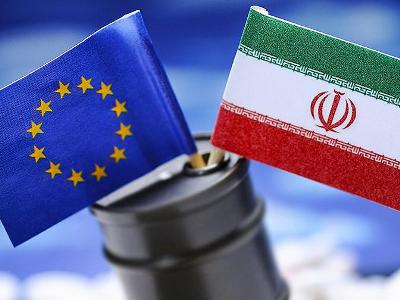
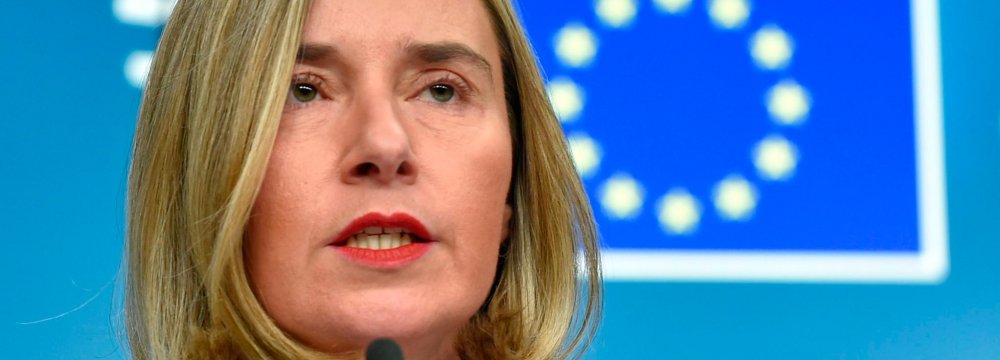
The SPV aims to keep trade flowing even if possible United States sanctions hit Tehran.
Asked at an event in New York when it could be established, Mogherini said, “I believe before November.”
European diplomats have described the SPV proposal as a means to create a barter system, similar to one used by the Soviet Union during the Cold War, to exchange Iranian oil for European goods without money changing hands.
> How Will It Work?
The foreign ministers of the EU, Germany, France, Britain, Russia and China agreed on Tuesday to set up a new mechanism to facilitate legitimate trade between European companies and Iran.
The goal: To bypass US sanctions, which have been reintroduced after US President Donald Trump unilaterally withdrew from the 2015 Iran nuclear deal, Germany's public international broadcaster Deutsche Welle reported.
A new legal entity will be created to allow financial transactions with Iran between oil companies and other businesses.
The EU's External Action Service says the measure is being created to "ensure the full and effective implementation of the Iran deal".
EEAS said the new payment system will "assist and provide reassurance to European businesses wishing to continue trading with Iran, mitigating the effect of reimposed US sanctions, in accordance with European Law."
In 2017, the EU was Iran's second largest trading partner, after China.
Some of Washington's new punitive measures against Tehran took effect in August; the rest are due to begin in November.
Even the EU does not know exactly how it will work at this stage. But several analysts suggest it could involve a barter system that would allow firms to bypass the SWIFT international bank transfer system.
Credits for oil or goods imported from Iran by one EU firm could be used to pay an EU exporter for its goods or services to Iran, without any funds being sent to the Middle East state.
The SPV would operate in euros rather than US dollars and US authorities won't be able to scrutinize transactions, unlike the SWIFT system, which is fully transparent.
EU technical experts are to meet shortly to flesh out the details of the plan.
"From what I understand, it would look like a clearinghouse, when Europe imports oil from Iran, the money will go to the SPV, and if a machine is sold by a European company in Iran, the payment will be made via the SPV. This mechanism would 'immunize' buyers and sellers by avoiding transactions in dollars that could expose them to US sanctions. Oil is the only counterpart that Iran can give. It allows oil revenues to be used to import goods," Karsten Brzeski, the chief analyst for the Dutch ING Bank, told Sputnik.
Such a mechanism could only work, however, for companies without any exposure to the United States, the analyst warned.
"As soon as there is exposure to the United States, I would guess that the US administration could impose direct or indirect pressure on companies not to use the SPV," Brzeski said.
> Will Big European Companies Use It?
In theory yes, but some trade experts doubt whether multinational firms such as Siemens and Total will risk their reputations and the possible threat of sanctions by Washington to continue to trade directly with Iran. The two companies have already announced they will be pulling out of Iran.
Rolf Mützenich, the foreign affairs spokesman for Germany's Social Democrats, told German public broadcaster Deutschlandfunk on Wednesday that he didn't think large German companies could be persuaded to use the SPV for fear of stoking further trade tensions with the US.
"Market forces are simply too strong for that," he said.
But he predicted that "small- and medium-sized firms, and perhaps one or two service providers too, might be interested, if their focus is on the Middle East or Iran".
Speculation has quickly grown that large European firms may use middlemen to mobilize SPV on their behalf.
"I cannot yet evaluate the potential efficiency of the sort of ‘clearinghouse’ that the Europeans want to create, based on the purchasing of Iranian oil, but I have great doubts that companies, especially the large ones would ever dare participate to such a scheme," Etienne de Callatay, the former chief analyst of Bank Degroof in Brussels, told Sputnik.
"The same for all major companies, such as Total, Peugeot or Volkswagen. They have already discontinued all operations and projects in Iran. Maybe [small- and medium-sized enterprises] could be interested, but there too, I have great doubts," Callatay added.
Drieu Godefridi, the founder of the l'Institut Hayek, agreed that there was nothing beneficial in the mechanism for bigger businesses.
"There will be no involvement of commercial banks and central banks, both of whom are terrified at the prospect of US retribution if they are seen to be going against US sanctions," Godefridi told Sputnik.
> Will SPV Offer EU Firms Enough Protection?
The EU, China and Russia clearly think so, hence its creation.
SPV will operate in addition to a blocking statute that Brussels passed last month, which would allow EU firms to sue the US treasury for compensation in the event that they are found to be in breach of the new sanctions.
But the immunity clause has not yet been tested in court.
All major European groups that were active in Iran have already canceled their projects in Iran even before any potential injunctions from the United States, and for smaller companies it would also be risky to have their identity revealed, Godefridi told Sputnik, adding that Europe cannot protect its companies against Washington's sanctions.
"If the European Union wants to be respected by [US President] Donald Trump, it should rigorously enforce its blocking regulations against Washington. If the US is persecuting European companies outside their territories, for example, on the grounds that they have resorted to the global payment system, Brussels would have to respond through compensation and redress. But is the EU ready to do that? I have great doubts. This barter agreement is a dead end," Godefridi said.
> What's Been the Reaction?
China fully supports the EU's proposal to set up a "special payments system" to facilitate trade with Iran and safeguard the Iranian nuclear deal, a move experts say will reduce reliance on the US dollar in global trade and further isolate it from the international community, Global Times reported.
If the US continues to push isolationism and unilateralism, and impose "long-arm jurisdiction" to sanction other countries who are paying efforts to preserve the Iranian nuclear deal and keep trade ties with Iran, it will force the EU to stand closer with China, Russia and Iran, Chinese experts noted on Wednesday.
Chinese Foreign Ministry Spokesman Geng Shuang said at Wednesday's routine press conference that safeguarding and implementing the Iranian nuclear deal is safeguarding the authority of the UN Security Council, the basic norms of international law, the international non-proliferation regime and Middle East peace and stability.
"All participants of the meeting are working to establish a settlement channel for Iran and allow Iran to continue to export oil," Geng said.
Some analysts say the EU's plan is purely symbolic in an attempt to stand up to Washington's unilateral decision to withdraw from the landmark nuclear deal with Iran. Some others think the plan is unworkable, as EU officials who set up the entity and banks handling transactions into and out of SPV, could also face punitive US measures.
US Secretary of State Mike Pompeo said he was "disturbed and indeed deeply disappointed" by the EU's announcement.
Trump's national security adviser, John Bolton, said Washington does "not intend to allow our sanctions to be evaded by Europe or anybody else".
German Foreign Minister Heiko Maas, meanwhile, told reporters on the sidelines of the United Nations General Assembly there was "strong unity" with Iran on minimizing the impact of US sanctions.


Gold price eases after Trump downplays clash with Fed chair Powell

Copper price hits new record as tariff deadline looms
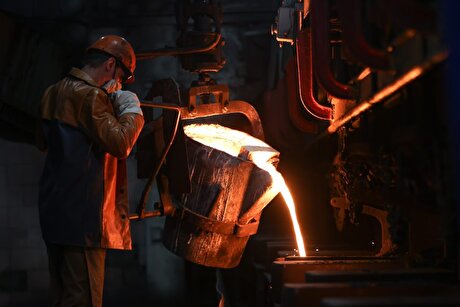
Brazil producers look to halt pig iron output as US tariff threat crimps demand

Three workers rescued after 60 hours trapped in Canada mine

Gold price could hit $4,000 by year-end, says Fidelity
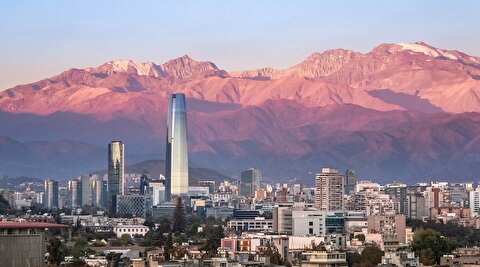
Chile’s 2025 vote puts mining sector’s future on the line

US targets mine waste to boost local critical minerals supply
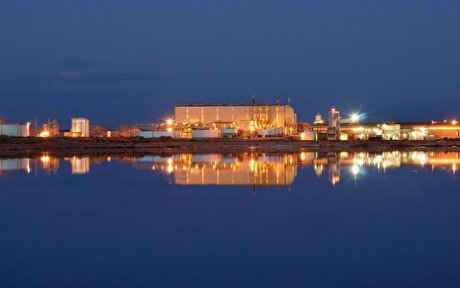
Energy Fuels surges to 3-year high as it begins heavy rare earth production

Glencore workers brace for layoffs on looming Mount Isa shutdown
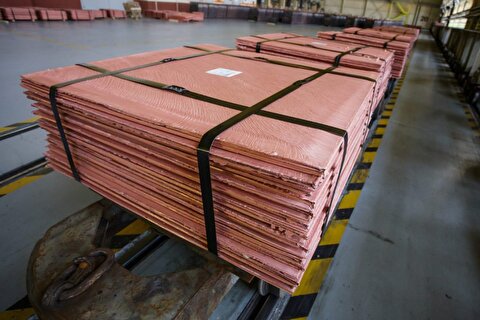
Trump tariff surprise triggers implosion of massive copper trade

Maxus expands land holdings at Quarry antimony project in British Columbia

BHP, Vale accused of ‘cheating’ UK law firm out of $1.7 billion in fees
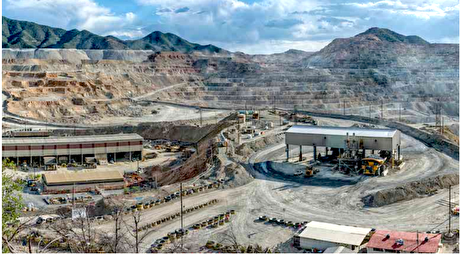
Southern Copper eyes $10.2B Mexico investment pending talks

American Tungsten gets site remediation plan approved for Ima mine in Idaho

Kinross divests entire 12% stake in Yukon-focused White Gold

Gold price could hit $4,000 by year-end, says Fidelity

Southern Copper expects turmoil from US-China trade war to hit copper

Ramaco Resources secures five year permit for Brook rare earth mine in Wyoming

Column: EU’s pledge for $250 billion of US energy imports is delusional

Trump tariff surprise triggers implosion of massive copper trade

Maxus expands land holdings at Quarry antimony project in British Columbia

BHP, Vale accused of ‘cheating’ UK law firm out of $1.7 billion in fees

Southern Copper eyes $10.2B Mexico investment pending talks

American Tungsten gets site remediation plan approved for Ima mine in Idaho

Kinross divests entire 12% stake in Yukon-focused White Gold

Gold price could hit $4,000 by year-end, says Fidelity

Southern Copper expects turmoil from US-China trade war to hit copper

Ramaco Resources secures five year permit for Brook rare earth mine in Wyoming














